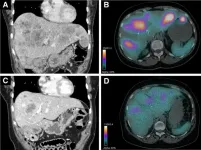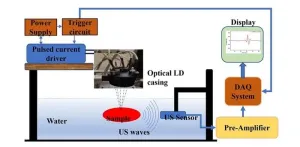New research from UBC Okanagan could make monitoring gut health easier and less painful by tapping into a common—yet often overlooked—source of information: the mucus in our digestive system that eventually becomes part of fecal matter.
Correct, what’s in our poop.
Researcher Dr. Kirk Bergstrom and post-graduate student Noah Fancy of UBCO's Biology department discovered a non-invasive technique to study MUC2, a critical gut protein, from what we leave behind in the bathroom.
“MUC2 is like the silent star in our guts. It’s constantly working to protect us, and its proper functioning is crucial for our overall health,” Dr. Bergstrom says. “It was originally thought that you could only access this important molecule from biopsies or tissue removed via surgery—highly invasive and painful procedures.
“However, our study shows mucus is actually a part of our stool, meaning we can get at it painlessly and at levels we could not before. Anytime we can do analysis non-invasively, it’s a win.”
Clues to health can be found in unexpected places, and Dr. Bergstrom’s team found a way to study important gut health markers from fecal-adherent mucus—a term that, in simpler words, refers to the mucus attached to our stool. This mucus, typically ignored and flushed away, contains a trove of information about gut health.
MUC2, a glycoprotein with many sugar chains attached, forms a protective barrier in our intestines in the form of mucus, safeguarding our gut from harmful microbes and toxins and playing a crucial role in digestive health.
Understanding MUC2 better could lead to significant advancements in managing and preventing gut-related diseases, impacting the day-to-day wellbeing of millions.
“We can use these new methods to visualize mucus-microbiota interactions and how they go wrong in various diseases, like inflammatory bowel diseases and colon cancer,” Dr. Bergstrom notes. “The sugars on the mucins also carry lots of information on the health status of the colon.”
Master of Science student Noah Fancy led the work, which was the result of a strong collaborative effort between the Bergstrom Lab, the chemistry labs of Dr. Wesley Zandberg and the biology labs of Dr. Sepideh Pakpour, Dr. Deanna Gibson and Dr. Sanjoy Ghosh, all at UBC Okanagan.
The work was funded in large part by the Weston Microbiota Foundation and the Canadian Foundation for Innovation.
This research appears in the Journal of Biological Chemistry.
END
UBCO researchers get to the bottom of non-invasive gut tests
Mucus contains vital data that may assist treatments for inflammatory bowel disease, colon cancer
2024-02-13
(Press-News.org)
ELSE PRESS RELEASES FROM THIS DATE:
Radiopharmaceutical therapy controls symptoms and reduces medications in insulinoma patients
2024-02-13
Reston, VA—Peptide receptor radionuclide therapy (PRRT) is effective for clinical control of symptomatic metastatic insulinomas, according to new research published in the February issue of The Journal of Nuclear Medicine. In the largest study to date of metastatic insulinoma patients treated with PRRT, more than 80 percent of patients had long-lasting symptom control, and nearly 60 percent were able to reduce the use of other drugs to treat the disease.
Metastatic insulinoma is a rare malignant neuroendocrine tumor characterized ...
First-of-its-kind ACC registry tracks cardiac procedures performed in ambulatory surgical settings
2024-02-13
The American College of Cardiology’s newest registry offers data-driven insights on cardiac procedures performed in the ambulatory surgery setting through its first-of-its-kind dashboard. The number of cardiac procedures being performed in ambulatory surgery centers has grown significantly in the last decade, leading ACC’s NCDR to create the CV ASC Registry Suite to fit into the established workflow and allow these facilities to measure and compare their patient care and outcomes to similar procedures performed in the hospital outpatient setting.
Ambulatory surgery centers (ASCs) are health care facilities that provide same-day surgical care, ...
Business operations affect fishermen's resilience to climate change, new study finds
2024-02-13
Timothy Frawley has spent the better of the past two decades working in and around commercial fisheries. Born and raised in Casco Bay, Maine, he grew up packing lobsters and pitching bait on Portland’s working waterfront. He has worked in commercial fisheries in California, Alaska and the Mexican state of Baja California Sur.
Throughout his years spent on working waterfronts, Frawley, a postdoctoral researcher affiliated with the University of Maine’s Darling Marine Center, closely observed the ways in which fishermen conducted their business, making decisions about what and how they fished, and how it affected their operations and profit.
“While ...
Not too late to repair: gene therapy improves advanced heart failure in animal model
2024-02-13
Heart failure remains the leading cause of mortality in the U.S. During a heart attack blood stops flowing into the heart. Without oxygen, part of the heart muscle dies. The heart muscle does not regenerate, instead it replaces dead tissue with a scar made of cells called fibroblasts that do not help the heart pump. If there is too much scarring, the heart progressively enlarges, or dilates, weakens and eventually stops working.
“The current thought is that advanced or chronic heart failure, a stage in which the cardiac muscle has become too weak, is a point of no return. The present ...
Seeking a middle ground for reducing greenhouse emissions
2024-02-13
As the world gradually transitions to making meaningful reductions in greenhouse gas emissions, one of the most crucial questions that needs to be answered is how much that change is going to cost.
The United Nations Intergovernmental Panel on Climate Change (IPCC) has put out reports on this potential cost that showed global greenhouse gas emissions can be reduced by at least half in 2030 at a cost of less than $100 per ton of CO2 equivalent. A new study from the University of Delaware, Yale University and Columbia University, however, points out that these estimates do not consider some hidden, underlying frictions ...
New study finds no significant association between preterm delivery and autism
2024-02-13
UNDER EMBARGO UNTIL: Feb. 13, 2024, 3:00 PM EST
Media Contacts: Karen Addis, APR, karen@addispr.com, +1 (301) 787-2394; Kerri Wade, MPA, kwade@smfm.org, +1 (202) 236-1780
National Harbor, Md. -- Autism, also known as Autism Spectrum Disorder (ASD), is one of the most common developmental disorders and is increasingly diagnosed worldwide. According to the World Health Organization, an estimated one in 100 children has autism. In the U.S., those numbers are much higher, with an estimated one in 36 children being diagnosed with autism, according to the Centers for Disease Control and Prevention. Research into the causes of autism, specifically whether there is ...
Advancing biomedical diagnostics: Compact photoacoustic sensing instrument for breast tissue characterization
2024-02-13
In the realm of biomedical sciences, the quest for accurate and efficient diagnostic tools is ever-evolving. One such promising innovation making waves is the photoacoustic (PA) technique. In the past decade, PA imaging has emerged as a viable imaging modality demonstrated in many clinical applications with promising outcomes. Unlike traditional methods, PA offers a noninvasive approach to probing biological tissues, yet the technique has still been limited in wide clinical applications, partially due to bulky and expensive laser sources.
In a recent study published in the Journal of Biomedical Optics, researchers from the Indian Institute of Technology Indore ...
Updating allocation algorithms could help donor hearts reach the transplant patients who need them most
2024-02-13
Receiving a heart transplant is a matter of life and death for many patients. Every time a heart becomes available, a “match run” is created to generate a list of transplant candidates ranked by an algorithm based on medical urgency, geography and pediatric status. Unfortunately, deceased donor organs are very scarce in the United States – so much so that some patients aren’t even placed on waitlists because it’s too unlikely that a heart will become available to them.
A research team led by experts at the University of Chicago Medicine developed a new risk score designed to predict the likelihood that ...
New study reveals dynamic impact of nicotine on brain regions responsible for reward and aversion
2024-02-13
HUNTINGTON, W.Va. – A new study led by researchers at the Marshall University Joan C. Edwards School of Medicine sheds light on the intricate interplay of brain regions involved in nicotine's effects on the human brain.
The research, published in eNeuro, an open-access, peer-reviewed scientific journal published by the Society for Neuroscience, explores how nicotine influences key areas associated with reward and aversion, showcasing a nuanced relationship that varies based on dosage, sex and distinct brain regions. The medial ...
New assay identifies clinically relevant gene fusions in pediatric tumors more accurately and efficiently
2024-02-13
Philadelphia, February 13, 2024 – Identification of specific gene fusions is critical for the successful targeted treatment of pediatric cancer patients. Researchers at Children’s Hospital Los Angeles have developed a novel assay that automatically integrates the data from multiple fusion identification tools (callers) and efficiently and accurately identifies clinically relevant gene fusions in pediatric tumors. Their results are reported in The Journal of Molecular Diagnostics, published by ...
LAST 30 PRESS RELEASES:
Urban trees can absorb more CO₂ than cars emit during summer
Fund for Science and Technology awards $15 million to Scripps Oceanography
New NIH grant advances Lupus protein research
New farm-scale biochar system could cut agricultural emissions by 75 percent while removing carbon from the atmosphere
From herbal waste to high performance clean water material: Turning traditional medicine residues into powerful biochar
New sulfur-iron biochar shows powerful ability to lock up arsenic and cadmium in contaminated soils
AI-driven chart review accurately identifies potential rare disease trial participants in new study
Paleontologist Stephen Chester and colleagues reveal new clues about early primate evolution
UF research finds a gentler way to treat aggressive gum disease
Strong alcohol policy could reduce cancer in Canada
Air pollution from wildfires linked to higher rate of stroke
Tiny flows, big insights: microfluidics system boosts super-resolution microscopy
Pennington Biomedical researcher publishes editorial in leading American Heart Association journal
New tool reveals the secrets of HIV-infected cells
HMH scientists calculate breathing-brain wave rhythms in deepest sleep
Electron microscopy shows ‘mouse bite’ defects in semiconductors
Ochsner Children's CEO joins Make-A-Wish Board
Research spotlight: Exploring the neural basis of visual imagination
Wildlife imaging shows that AI models aren’t as smart as we think
Prolonged drought linked to instability in key nitrogen-cycling microbes in Connecticut salt marsh
Self-cleaning fuel cells? Researchers reveal steam-powered fix for ‘sulfur poisoning’
Bacteria found in mouth and gut may help protect against severe peanut allergic reactions
Ultra-processed foods in preschool years associated with behavioural difficulties in childhood
A fanged frog long thought to be one species is revealing itself to be several
Weill Cornell Medicine selected for Prostate Cancer Foundation Challenge Award
Largest high-precision 3D facial database built in China, enabling more lifelike digital humans
SwRI upgrades facilities to expand subsurface safety valve testing to new application
Iron deficiency blocks the growth of young pancreatic cells
Selective forest thinning in the eastern Cascades supports both snowpack and wildfire resilience
A sea of light: HETDEX astronomers reveal hidden structures in the young universe
[Press-News.org] UBCO researchers get to the bottom of non-invasive gut testsMucus contains vital data that may assist treatments for inflammatory bowel disease, colon cancer


